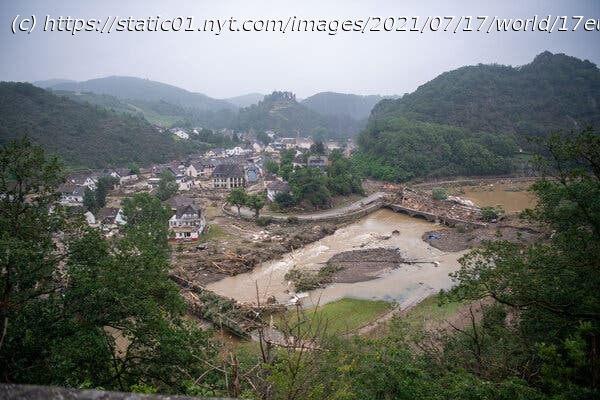With more than 160 dead across the region, the receding waters revealed extensive damage as well as deep political divides around how far and fast Germans should go to stem carbon use.
With the death toll surpassing 160 and rescue efforts intensifying, the once-in-a-millennium floods that ravaged Germany and much of Western Europe this week had by Saturday thrust the issue of climate change to the center of Germany’s politics and its campaign for pivotal elections this fall that will replace Chancellor Angela Merkel after 16 years in power. The receding floodwaters revealed not only extensive damage — homes wiped away, businesses lost, electricity and sewer systems knocked out and hundreds of vehicles destroyed — but also bitter political divides on climate policy in a week when the European Union rolled out the globe’s most ambitious proposals to cut carbon emissions in the next decade. Though German authorities said it was still too early to place a figure on the damage, its sheer scale shifted the debate from calls not to politicize the catastrophe to the realization that the policies behind it must now play a central role in deciding who will take over leadership after the election on Sept.26. “The Weather is Political,” Germany’s ARD public television said in its lead editorial on the Friday evening news. “For a long time, chatting about the weather was synonymous with triviality. That’s over now,” it said. “The weather is highly political; there is hardly any nonpolitical weather anymore, especially not during an election campaign.” The death toll in Germany climbed to at least 143 on Saturday, while the toll across the border in Belgium stood at 24, the authorities there said. On Saturday, rescue workers were still sifting through ruin across the region. The German news media was filled with images of homes still submerged in muddy brown water up to the second floor and of bridges reduced to crumbled heaps of stone or tangled metal pylons. Tales of tragedy emerged, as well, perhaps none more poignant than in Sinzig, where neighbors recalled hearing the screams from disabled residents trapped in the waters that gushed into the lower floors of the residential home where a lone night watchman was powerless to save them. The event vividly raised tough questions about whether the authorities had been prepared and why flood warnings were not acted on more aggressively by local officials. More than 90 of those who died in Germany had lived in towns and villages in the valley of the Ahr River in the western state of Rhineland-Palatinate, the police said. Local authorities set up a hotline for citizens in the hard-hit area needing support, whether material or psychological, and issued a call for equipment to help provide basic infrastructure and even clean drinking water. Ms. Merkel, who turned 67 on Saturday and has said she will leave politics after the election, was expected to visit the district on Sunday to survey the scope of the destruction, her office said.
Start
United States
USA — Science Floods Thrust Climate Change to Center of German Campaign as Toll Mounts






